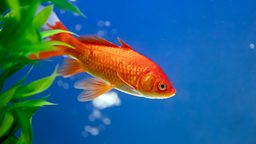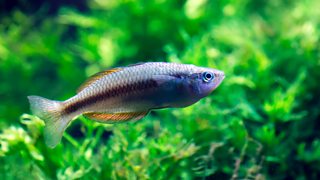Are fish memories really as bad as we think they are?
Turning to the animal kingdom can help us answer some of life's big questions. In �鶹�� Radio 4's Naturebang, presenters Becky Ripley and Emily Knight look to the natural world to learn more about what makes us human.
In this episode, Becky and Emily are struggling to recall the old joke about a goldfish's memory… ironically so. But do goldfish, or other fish for that matter, really have bad memories? And how well do our own memories stand up under scrutiny? Professor Culum Brown from Macquarie University joins them to shed some light on fish memory, while criminal psychologist Doctor Julia Shaw talks about the fallibility of our own ability to remember.
Here are the key findings from Becky and Emily's investigation into marine life and memory.

The idea that fish have short memories is a total myth
The common myth spread around about goldfish is that they have a three-second memory, no doubt attributed to the way they endlessly circle their bowls. However, many cultures share this belief about a wide array of fish species. Professor Culum Brown speculates that, perhaps, this view of fish is an excuse to justify treating them poorly.
However, in a less cynical view, it may be that our underestimation of fish intelligence stems from a basic misunderstanding of evolution. Culum summarizes this misconception, saying people believe that “fish are simple and ancient creatures unchanged for half a billion years”, and therefore less intelligent. But in reality, most of the fish species alive today have had longer to evolve and adapt than we have.
Scientists have known for years that fish are more clever than we give them credit for. In 1973, Nikolaas Tinbergen, Konrad Lorenz, and Karl von Frisch were awarded the Nobel Prize in Physiology or Medicine for their work on animal social behaviour. Part of this research delved into the ability of different fish to remember and pass on information to other fish in their community. Through the 1980s, 90s and 2000s these findings were further consolidated through a litany of scientific papers.
Fish exhibit complex social habits that rely on long-term memory
Culum’s own experiments with rainbowfish in Australia turned up results that corroborate this body of research. While teaching students about how to design scoops for fishing trawlers, in order to allow unwanted fish species to escape, Culum noticed that his sample fish got quicker at finding the escape hole on subsequent attempts. He tested this theory more thoroughly later on, finding that the rainbowfish that were experienced with the scoop not only remembered where the escape hole was, but also learnt to U-turn before the scoop to easily escape the trawl.

Eleven months after the experiments ceased, the same fish were able to replicate the behaviour when reintroduced to the scoop. Clearly, Culum’s studies demonstrate a capacity for long-term memory in fish. But there’s more – when new fish were grouped in with experienced fish, they too would find the hole faster. This demonstrates a social ability to learn or copy between individuals.
When we observe these kinds of behaviours, Emily realises that “it’s kind of bonkers to think that we ever thought that fish would have terrible memories”. After all, fish require a wide array of skills dependent on long-term memory in order to survive in the wild – social learning, relationships, recognition of familiar individuals, spatial learning and navigating huge distances. Think of salmon who migrate hundreds of miles upriver to spawn, or Pacific herring that have specific foraging grounds they habitually return to across generations. In fact, almost all animals would struggle to survive without this capacity for long-term memory.
Human memories are often false or faulty
Given our inaccurate judgement of fish memory, is human memory really as great as we claim? Our memories are more fallible than we like to think. Doctor Julia Shaw explains that “your brain is constantly filtering from the very first perceptual moment when you experience something” to harvest only the most essential facts. This poses a problem for memory reliability – most things that have happened to us we don’t actually remember. Instead, our brain fills in the blanks by creating false memories. Things that either never happened, or things that are only partially true.

In criminal psychology, this phenomenon is a serious issue. It can lead to unknowingly false testimonies from eyewitnesses, or explain why two witnesses recall different versions of events (and therefore lead to conflicting associations with that event). In fact, even the process of recalling a memory itself can alter our memories. When we hear someone else confidently recall their version of events, it can bleed into our own memory. Julia calls this the “social contagion” effect, the ability to absorb a false memory.
There are still facts underlying our false memories, of course. Julia says that different people’s memories have “a shared foundational part of that experience that we could call the truth”. In other words, the overlap of subjective memories typically leads to fact. You can also compare memories that are written down at the time of an incident with how the individual recounts the events months later to see which details remain consistent. This way, we can separate contaminated memories influenced by other witnesses or information online.
Our sense of self is impacted by our false memories
False memories aren’t some mistake – they’re a feature of how our brain works. Most of our memories are so-called ‘gist’ memories, these are memories that capture the spirit of an event rather than the exact details. These are opposed to much rarer ‘verbatim’ memories that exist for specific sentences, lyrics and facts. Julia gives the example of when she met her grandfather for the first time. The emotional memory attached to meeting him was more important than remembering the actual words they said to each other.
We seem to be a 'constructed hodgepodge of real and false memories'.
If these false memories are so pervasive, what does this say about our sense of self? Our identities are often constructed upon our memories, and the memories others have of us. We seem to be, in Becky’s words, a “constructed hodgepodge of real and false memories”. While these false memories can change our perceptions, it’s important to remember that our lives are like stories based on real experiences; at times they may be exaggerated or warped, but they’re still set primarily in fact.
It seems, then, that we shouldn’t act so high-and-mighty compared to the humble fish. It could be that our ability to remember might be closer to the perceived failings of our fishy friends than we’d like to think.
To hear more about how the memories of fish compare to our own, listen to the episode in full.

More articles from Radio 4
-
![]()
Should we be doing a whole lot more... nothing?
The natural world seems like a busy place. But the truth is, most animals spend most of the time doing absolutely nothing at all.
-
![]()
Is the animal kingdom having a laugh?
Eight findings about laughter from Becky and Emily's investigation into the natural world.
-
![]()
Michael Mosley: Five ways to unwind and find Deep Calm
Here are my five ways to find inner stillness and calm…
-
![]()
Michael Sheen: 'It's so overwhelming, once you discover the truth'
Sheen explains what drew him to the story and how he feels about the shocking legacy of PCBs in the UK.





